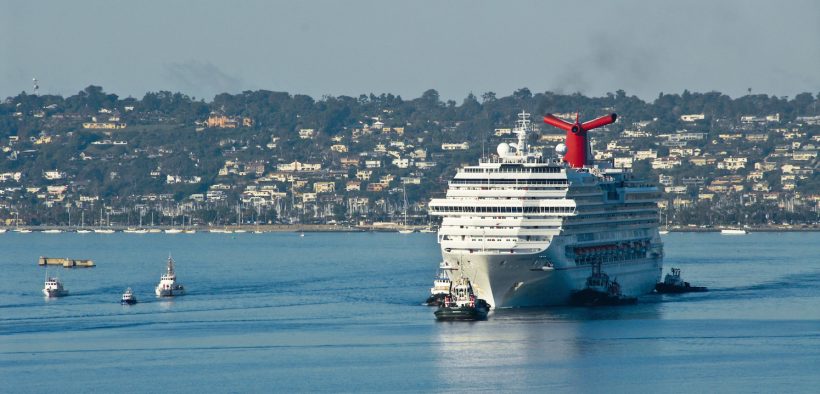How Cruise Lines Lobby Congress to Block Victim Compensation Bills

Carnival Corp, the world’s largest cruise company, has spent $400,000 on lobbying this year. Royal Caribbean Cruises ranks second at $357,000.
(By Yue Stella Yu, Center for Responsive Politics) For families whose loved ones suffer an accident on ships sailing the high seas, it isn’t an option to sue cruise lines for physical or emotional losses, even when the companies are at fault.
The “Hammers’ Law,” sponsored by Sen. Deb Fischer (R-Neb.), aims to challenge the status quo. Named after two victims who lost their lives to a fire on a Peruvian river cruise in 2016, the bill would expand the compensation families can pursue from cruise lines in cases of on-board accidents.
The bill gained support from the American Association for Justice, a group representing trial attorneys across the country. Lobbyists backed by powerful cruise lines, however, have blocked similar efforts for years.
The bill would amend the near-century-old Death on the High Seas Act, which was designed to give the relatives of deceased seamen the right to remedy. Under the current law, families may only claim compensation for losses that are of precise monetary value except in cases of an aviation accident.
Fischer’s bill comes from a section in the Cruise Passenger Protection Act sponsored by other lawmakers over the years in response to on-board incidents such as thefts, rapes and deaths. The bill aimed to enhance safety protection and expand passenger rights, but the efforts never came to fruition.
Former Sen. Jay Rockefeller (D-W.Va.) co-sponsored the bill in 2013, arguing that the cruise line industry sometimes treats travelers “with shocking callousness and disregard.” A statement from the Cruise Lines International Association, a trade group representing more than 50 member cruise linesworldwide, later dismissed his safety concerns as presenting a “distorted picture” of the industry.
The trade group says the cruise industry is highly regulated and “cruise travel is decidedly safer than most forms of transportation.” The number of “operational incidents,” it says, dropped by 37 percent from 2009 to 2018.
Government statistics tell a different story. From 2016 to 2018, reported on-board criminal activitiesrose from 92 to 120.
Rockefeller’s bill died in 2014 in the Senate Commerce Committee he chaired. Both Carnival Corp and Royal Caribbean Cruises spent hundreds of thousands on lobbying as they focused on passenger safety issues that year, quarterly reports show.
Similar efforts to champion the legislation in the following years stalled in both chambers, as cruise line companies poured in millions to lobby the Hill.
The cruise industry trade group, whose PAC attracted large donations from major cruise line employees, has been active in arranging fly-ins to connect company executives and politicians at its annual Congressional Cruise Caucus.
The group spent $1 million in the first half of this year to sway the Congress on Fischer’s bill and tax issues, quarterly reports show. The organization didn’t respond to requests for comment.
Carnival Corp, the world’s largest cruise company, has spent $400,000 on lobbying this year. Royal Caribbean Cruises ranks second at $357,000.
American Association for Justice, the only organization lobbying in favor of the “Hammers’ Law,” poured in $1.35 million in the second quarter to lobby on multiple issues including Fischer’s bill.
The Death on the High Seas Act was designed to compensate families losing a wage earner and needs to be updated to “reflect the modern travel,” said Sue Steinman, a spokeswoman on behalf of the organization. AAJ has backed similar efforts expanding the right to remedy in the past, she said, and Hammers’ Law is “supportable” for that purpose.
The trial attorney association’s PAC contributed a total of $13,000 to several members on the Senate Commerce Committee during the 2020 cycle thus far.
In the meantime, major cruise lines have also given money to key lawmakers sitting on the committee.
One of the co-sponsors of Rockefeller’s 2013 bill, Sen. Richard Blumenthal, (D-Conn.) received $14,300 from American Cruise Lines since the 2015 election cycle. Carnival Cruise Lines gave $10,700to the committee’s ranking member, Sen. Maria Cantwell (D-Wash.), during the same period of time, and the cruise line trade group gave $13,500 to committee member Sen. John Thune (R-S.D.).
For the current cycle, the trade group’s political action committee contributed $2,000 to committee chairman Sen. Roger Wicker (R-Miss.) and $2,500 to committee member Sen. Dan Sullivan’s (R-Alaska) leadership PAC, True North PAC. Fischer, who’s sponsoring Hammers’ Law, received $1,500 from Micky Arison, chairman of the Carnival Corp board.
Executives of Carnival Corp, Royal Caribbean Cruise Lines and Norwegian Cruise Lines and their family members have given a combined $42,400 this year to Fischer, Wicker, Sullivan and his PAC, as well as Cantwell.
Sullivan, who cited possible damages to Alaska’s tourism economy and helped kill a proposed tax increase on cruise companies in 2017, has received the most money among his peers from the cruise ships and lines industry during the 2020 election cycle.
















Mother loses daughter on royal carib cruise gets nothing has to pay their attorney fees as punishment by Judge of Justicide Jonathan Goodman of miama fed court. Wonder how many cruise passes he gets a year from rcl? See http://www.CourtApprovedMurderOnTheSeas.com or search Martins v Royal Caribbean